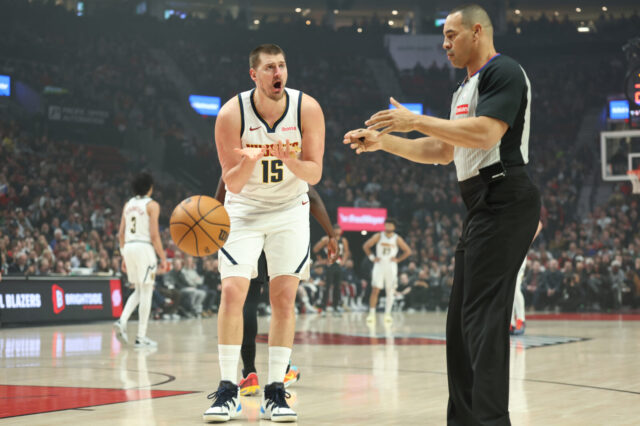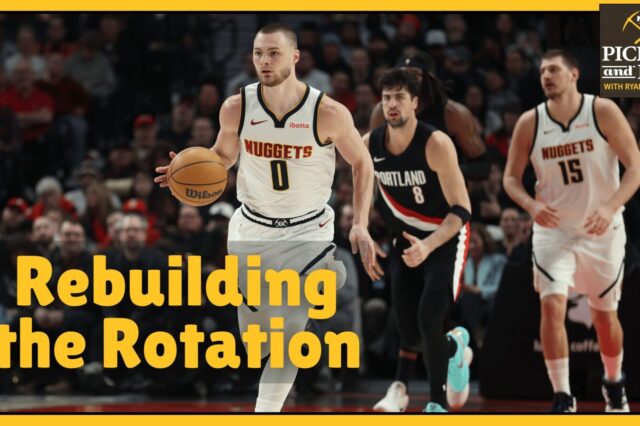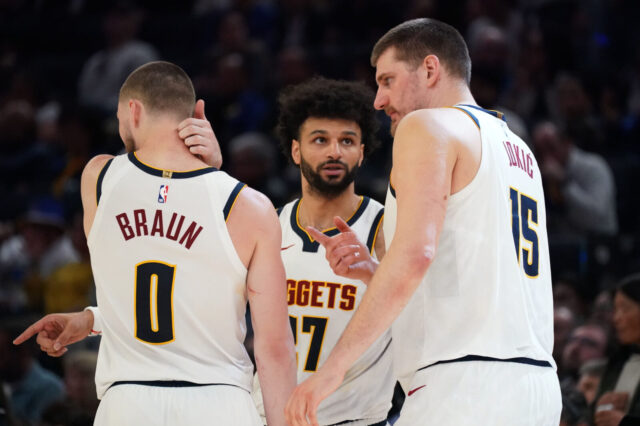You play fantasy football, right? CNBC says that 37 million of us do; and if you’re one of them, you’ve likely been involved in a trade. The thing about trades, especially in fantasy football, is that they’re generally designed to screw your buddy. Rarely is a player swap truly mutually beneficial.
As a fantasy owner, you’ve also probably had one of those seasons where you’ve got a whole-lotta-nuthin on your roster. From day one after the draft, you know your team lacks oomph. You work the phones, desperately trying to convince your fellow GMs that “two Ryan Mathews, plus a kicker” – is worth “one Peyton Manning.”
Of course, your buddy ain’t takin’ the bait. There are only so many spots on a roster – one Ryan Mathews-type is plenty; two makes for a roster that strikes fear into no one. You understand this, but try anyway.
You probably understand what Tim Connelly feels like this morning, too.
Connelly, the second-year GM of the Denver Nuggets, is swimming in fantasy frustration – only there’s nothing fantasy about his very real situation. The Nuggets are that team, the one with a whole-lotta-nuthin’.
Yesterday, reports surfaced that Connelly and Co. unsuccessfully tried to move J.J. Hickson, JaVale McGee and a protected first-round draft pick to Brooklyn in exchange for Brook Lopez, a legit NBA big man with a scorer’s touch (he’s averaged 17.7 points during his last 10 games). Best yet, Lopez has a favorable contract for teams trying to acquire “stuff” – things like draft picks and contracts that allow for flexibility and bargaining power for the future.
Lopez, who would arrive with a $15.7 million price tag, is expensive. But with only a player option remaining on his contract for next year, he would become the ultimate bargaining chip should the Nuggets acquire him. Lopez could be the centerpiece of sorts in a rebuilding project, or he could be appetizing trade bait for any playoff contender lacking a quality big man.
Everyone, including and especially the Nets, understands this. And everyone involved knows the clock is ticking; the Feb. 19 trade deadline looms large. The trouble is that Denver and Brooklyn are essentially the same team. Denver enters tonight’s game against Philly with a 19-29 record; realistically, they’re not a playoff contender. Brooklyn currently owns a 19-28 mark; they aren’t exactly making a postseason push, either. Both teams, by most accounts, are in rebuilding mode.
It really comes down to one simple truth: Whoever wants to get the deal done most will be the one to blink.
Brooklyn and Denver are different in the respect that they have a unique set of problems. Brooklyn has a great team – if it was 2010. Aside from Lopez, the Nets are filled with expensive has-beens from that management has unsuccessfully tried to squeeze just one more quality season. Denver, on the other hand, is like that dreaded fantasy football team.
If players are ranked on a scale of 1-10, with 10 being Anthony Perkins or Chris Paul and 1 being a D-League call-up, the Nuggets are built with a bunch of 5s, 6s and 7s. They don’t have 1s and 2s, nor do they have any 9s or 10s. They – like that unenviable fantasy owner – are in no-man’s land. They’re mediocre from top to bottom. They can’t dangle the big carrot because they simply don’t have one.
In the NBA, a team is better to have one or two 8s, 9s or 10s, and a bunch of 2s 3s and 4s than a roster filled with “okay” guys. Still, Denver can help Brooklyn and Brooklyn can help Denver. Sure, there are other teams that could make sense, but Lopez represents a very unique acquisition, one that offers Denver both upside and flexibility.
Late reports yesterday noted that the Nuggets had inserted the first-round draft pick from Memphis. It wasn’t good enough, but the move marked a fairly strong commitment to try to get something done.
My advice? Go all in.
Why not toss in something or someone else? How about that other draft pick?
The Nuggets also own a first-rounder from the Thunder – but it’s also protected. In other words, neither of the first-round picks owned by the Nuggets will result in a top-five draft selection. At best, the Memphis pick could turn into a No. 6 to 14 pick this year or next year. The Oklahoma City pick, at best, could turn into the No. 19 pick in this year’s draft or the No. 16 pick in 2016. Ask yourself this: When was the last time a draft pick that low turned into a superstar? What are the odds?
How about another player? Even if the “other” player is a Nuggets starter, who cares? If the Nuggets can sweeten the deal, free up cap space and earn flexibility towards the future, it’s mission accomplished. Might it be ugly until that process begins? Sure. But the here and now isn’t necessarily pretty.
Connelly can’t act haphazardly and still needs to play his cards right, but reality suggests he’s got a crappy hand. My friend Chris Dempsey perhaps penned it best:
“There are only limited times when meaningful change doesn’t require sizable risk.
This is not one of those times for the Nuggets.”
Or when viewing the situation from the bench or stands of a team that’s currently going nowhere, there’s another way to put it:
What’s there to lose?



